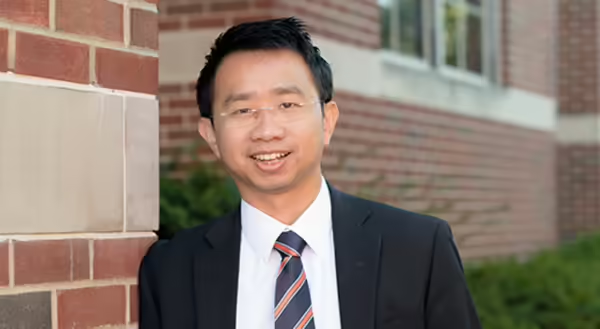
Name: Dr. Kevin Tan
Pronouns: He/Him/His
Title: Assistant Professor
Department: School of Social Work
Research/ Professional interests: (keywords) Social-Emotional Learning, Academic Achievement, Equity, Schools, Families, Communities
How did you become interested in public engagement?
I started my career as a school social worker. Over the years, I have worked with many young people who struggle socially and emotionally. It became apparent that engaging their families, peers, and teachers is a critical aspect of the helping process. Since then, I have integrated a relational approach in the work that I do, both in my research and teaching. In this way I avoid becoming sealed in the so-called ivory tower and ensure my work is grounded in the realities of the lived experience of individuals. I believe that social change must come from the bottom up. Thus, I seek to enhance the lives of young people in ways that are relevant and relatable to ordinary people in my teaching and research.
What kinds of engaged scholarship are you involved in now? (This can include community-engaged research, teaching, and/or outreach.)
Recent events such as the COVID-19 pandemic, the racial uprisings of summer 2020, and the Capitol insurrection require attention to the social-emotional development of young people. Adults must work collaboratively with young people to foster their sense of identity, agency, and belonging. In my research, I work with multiple school districts and youth agencies to implement social and emotional programs based on data that I collect and analyze. This approach ensures that my research provides insights that are relevant to schools as they seek to serve students and families.
My teaching is also informed by my ground-level research experience. I teach a graduate-level course on Social Work Practice with Children and Youth. In my classes, I typically invite agencies and practitioners to come into my classes to discuss their approaches to foster young people’s social-emotional skills. I also bring my students to visit agencies in the community to gain deeper insights into social work practice. Additionally, in this fall semester, I will be teaching a doctoral-level course that focuses on social work pedagogy and social justice. This course will draw on my experience working with K-12 educators to prepare doctoral students to be effective instructors with future social workers.
Any recent successes or insights from your work?
We need to actively integrate young people’s voices when developing solutions towards societal change. With Co-PI Dr. Durriyyah Kemp (Extension), my Healing Illinois project involved working with a dozen undergraduate and graduate social work students to host racial healing dialogues and focus group discussions with youths, parents, and educators. This work led to a follow up project involving the use of photovoice, a community participatory research method, to understand youths’ identity, agency, and belonging in this period of recovery from the pandemic and cycles of racialized violence.
Additionally, creating social change involving young people must involve work targeted at the broader community and systems-level. I have facilitated community-based conversations with the Mahomet-Seymour School District to understand its constituents’ vision for the district as it relates to promoting SEL and diversity. I have also organized and delivered district-wide staff professional development trainings on SEL with the Mahomet-Seymour schools and the Aspira of Illinois Network in Chicago. More recently, I have been working with the Danville School District and the Midwest PBIS Network to develop school-level systems of support focusing on students’ positive social-emotional-behavioral development.
What tips would you offer to other scholars looking to become involved in public engagement?
Be relevant and relatable. This means listening closely to the voices at the ground-level and allowing it to guide our agenda. We need to step out of our campus offices and immerse ourselves in the communities that we seek to serve. Be attentive to the lived experience of individuals, particularly those who feel oppressed and marginalized. Make the effort to reach out to them; a simple smile and greeting can go a long way to acknowledge their presence. Avoid interacting in ways that disconnects you with folks out there. Don’t use jargon or get caught up with presenting sophisticated statistical methods or complex research designs. Do not expect to teach the communities you serve—seek to learn from them.
Embrace collaboration (not competition). Public engagement work requires us to build authentic partnerships not only with our communities but with other scholars. We lose the core meaning of public service if we are only trying to outdo each other. We can do more for our communities and society if we leverage each other’s strengths. This means being open, truthful about our intentions and actions, and generous with our knowledge and expertise.
Always stay humble. Reflect on our own privilege, power, and status. Public engagement work requires a degree of cultural humility. What this means is to be first aware of our own beliefs, identities, and cultural heritages, and always being mindful of our power differences when interacting with our communities. Recognize that this is a lifelong process. Being humble enough to learn from our communities is the best way to do public engaged work!